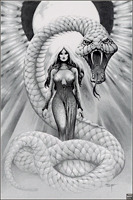Sentience in the Medb hErenn Universe
 In science fiction, the term sentience is often used to indicate that an entity has various human qualities such as intelligence, personality, creativity, and morality. While this was meant to be a simple term to convey a complex concept for the sake of convenience, it has been misappropriated.
In science fiction, the term sentience is often used to indicate that an entity has various human qualities such as intelligence, personality, creativity, and morality. While this was meant to be a simple term to convey a complex concept for the sake of convenience, it has been misappropriated.Even in the Medb hErenn universe, the mind is still a major mystery. It is generally accepted to be an emergent property of the brain that manifests aspects of the intellect and consciousness as combinations of thought, perception, experience, memory, emotion, will and imagination.
Thought, or cognition, is a catchall concept that includes any type of mental form, process, and ability. Perception is the ability to be aware of and understand sensory information. Experience, or empirical knowledge, is the acquisition of knowledge about a thing or event through interaction with that thing or event using perception. Memory is the ability to store, retain, and recall knowledge.
Emotion is a subjective experience based on feelings and involving an individual's thoughts and personality. Will is defined as self-direction and self-governance. Imagination is the ability to create concepts and experiences that are not perceived through the senses, but by cognitive means.
The intellect, or intelligence, describes cognitive abilities such as experience, reasoning, planning, problem solving, abstraction, comprehension, communication, and learning. It touches on wisdom, which is accepted to be the ability to use knowledge well. Reasoning is the acquisition of knowledge about a thing or event using thought, imagination, and insight. Insight is seen as the ability to derive a rule that links cause with effect; to take seemingly unrelated experiences and bits of information, and links them together to create a model of how something works. Abstraction is the ability to derive general ideas from specific objects and events.
Consciousness is understood to be self-awareness, the ability to distinguish between one's self and all other things and events. This in turn allows for Intentionality, which is the ability to have thoughts that mean something or are about something.
In this context, sentience is the cognitive ability to have subjective perceptual experiences. This can be as simple as being able to feel pleasure or pain and react to it, or as complex as being able to understand pleasure or pain and to make conscious choices based on it. Even so, it is considered to be fundamentally different from intelligence, will, and imagination. Sentience is entirely subjective, being based on feelings, whether sensory feelings or emotional and cognitive feelings. Each being will feel or understand an experience differently, based on its own unique personality.
Many of the ideas implicit in the science fiction definition of sentience are better reflected by the concept of sapience. Sapience is connoted with wisdom and is defined as the ability to exercise appropriate judgment. Implicit in this concept is more than just intelligence, but also will and imagination. However, sapience itself would not work as a science fiction substitute for sentience, because it does not imply consciousness.
This leaves us with a conundrum. Being separate, if interactive, aspects of the mind, sentience, sapience, and consciousness may be sufficient qualities for being "human", but they are not necessary. There are many creatures on Earth that demonstrate sentience but not sapience or consciousness, and there are many others that demonstrate the first two but not the third. Similarly, there is no reason to believe that there cannot be beings that demonstrate sapience and consciousness, but not sentience, or beings that are sentient but have no empathy. There could even be entities that are conscious but not sapient or sentient.
So what term can we use in place of sentience? Person could be the best choice, but it has its own set of problems. Human isn't much better and is anthropocentric. A made-up word such as Daonnacht (based on the Irish adjective for human), would be a good compromise, but would be too simple for the complex nature of the concept it represents. Exactly what would make a being Daonnacht? Too specific a definition would exclude many entities that should be included, while too broad a definition would include many entities that should not.
In the end, we can only acknowledge that no single term is possible. As such, many people may continue to use sentience as a convenience, or make distinctions based on sentience, sapience, and consciousness. The only alternative would be to invent a complex system that attempts to categorize beings on the basis of the degree of sentience, sapience, consciousness, empathy, technology, etc., they display. Even then, the question of what constitutes the basic nature of "humanity" would still probably go unanswered.
Published on September 03, 2013 04:48
•
Tags:
consciousness, medb-herenn, mind, sapience, sentience
No comments have been added yet.
Songs of the Seanchaí
Musings on my stories, the background of my stories, writing, and the world in general.
- Kevin L. O'Brien's profile
- 23 followers



